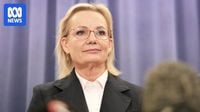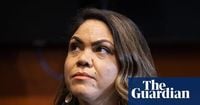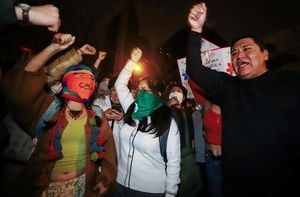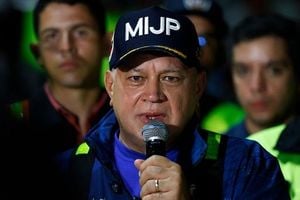On September 10, 2025, the simmering tensions within Australia’s Liberal Party burst into public view as Opposition Leader Sussan Ley sacked Jacinta Nampijinpa Price from the shadow ministry. The move, which followed days of mounting controversy, has sent shockwaves through the country’s political landscape and exposed deep divisions within the opposition ranks over leadership, immigration, and party direction.
At the heart of the crisis were Price’s comments made during a radio appearance the previous week, where she suggested the Labor Party encouraged Indian immigrants because they tended to vote for it. The remarks, widely condemned as offensive by Prime Minister Anthony Albanese, Price’s own party colleagues, and members of the Indian-Australian community, triggered a wave of calls for an apology. Despite the mounting pressure, Price remained steadfast, refusing to issue the apology that many—including key Coalition figures like Nationals Leader David Littleproud and Alex Hawke—had demanded. According to ABC News, Ley stated, “Despite being given the time and space to apologise, Senator Jacinta Nampijinpa Price did not offer an apology today—and many Australians, not just of Indian heritage, have been calling for that apology—for remarks that were deeply hurtful.”
The controversy came to a head on September 10, when Price, speaking to reporters in Perth, declined to express confidence in Ley’s leadership, repeatedly stating that “those matters are for our party room.” This refusal, more than the original comments themselves, proved to be the decisive factor in Ley’s decision to remove her from the shadow ministry. As Ley put it during a press conference in Hobart, “Today, Senator Jacinta Nampijinpa Price critically failed to provide confidence in my leadership of the Liberal Party. Confidence in the Leader is a requirement for serving in the shadow ministry.”
Price, a high-profile senator from the Northern Territory who had transitioned from the Nationals to the Liberals after the last election, had previously held the defence industry and personnel portfolio. Her rise to national prominence was cemented by her leadership of the successful No campaign during the 2023 Voice referendum—a career high point, according to ABC News. However, her move to the Liberals was not met with universal acclaim, and her bid for the deputy leadership failed after Angus Taylor lost to Ley. Since then, Price had been given a junior portfolio and, as of this week, is now relegated to the backbench.
In a written statement acknowledging Ley’s decision, Price expressed regret at “not being clearer” in her comments about Indian migration but doubled down on her core message. “My concern—as it is for millions of Australians—is Labor’s mass migration agenda and its ramifications. My concern is not migration itself—it’s the magnitude of migration,” she wrote, as reported by The Guardian. “Migration at the current scale and pace is putting excessive pressures on housing, infrastructure and services. And that makes life tougher for all families. I want to see a better life for all families—whether you’re a migrant, a resident, or a citizen—and regardless of your background.”
Price also took the opportunity to criticize her colleagues, stating, “I took the opportunity to express to the leader my disappointment that some colleagues disregarded the key point I was making about the damaging impacts of mass migration. And that some colleagues instead chose to indulge agenda-driven media commentary on this matter.” Yet, despite the acrimony, she accepted the outcome, adding, “This has been a disappointing episode for the Liberal Party. I will learn from it. I’m sure others will too. No individual is bigger than a party. And I’m sure events of the past week will ultimately make our party stronger.”
While Ley’s decision has been described by political analysts as her “only option,” it is not without risks. According to ABC News, this was the first major test of Ley’s authority as opposition leader. Had she failed to act, she could have appeared weak and indecisive, especially in the face of such a public challenge to her leadership. Liberal senator Dave Sharma summed up the mood within the party by asking, “If a shadow minister can’t say whether she supports the leader, what is she doing there?” In the end, Ley acted decisively, but the fallout may only deepen existing rifts within the party.
Price remains one of the most high-profile figures in the opposition, with strong support among the Liberal membership and conservative commentators who endorse her hardline stance on immigration. Her removal from the frontbench now gives her greater freedom to speak out on contentious issues—not only immigration, but also climate change and Indigenous affairs. “Although I will be returning to the backbench, I will continue to speak up on issues which are in the national interest and that are important to millions of Australians,” Price said in her statement, as reported by The Sydney Morning Herald.
The episode has also highlighted the broader challenges facing the Liberal Party. As ABC News noted, the party remains deeply divided over climate ambition, migration, and strategies for regaining support in urban seats. Price’s sacking may have shored up Ley’s authority in the short term, but it risks inflaming internal divisions, especially among those who feel the party is drifting away from its base. Some within the party have voiced concern that the removal of such a prominent conservative voice could alienate key constituencies. Former Prime Minister Tony Abbott weighed in on the controversy, saying, “Jacinta Price will be a big loss to the frontbench but I’m confident that she will continue to make a strong contribution to our public life.”
The impact of Price’s comments was felt far beyond the corridors of Parliament. Ley, in a bid to address the fallout, visited ‘Little India’ in Sydney’s Harris Park on September 7, where she met with local businesses and community leaders. According to The Guardian, she was told that many in the community felt their “hearts were broken” by Price’s remarks and that an apology was needed. Ley’s outreach was an attempt to reassure the Indian-Australian community that their concerns were being heard, but the damage had already been done.
Looking ahead, the Liberal Party faces a period of soul-searching and, likely, further debate over its direction. Price’s relegation to the backbench frees her to advocate for alternative positions, potentially amplifying the very divisions Ley sought to contain. For now, Ley has demonstrated her willingness to enforce discipline and uphold standards within her team, but whether this will restore unity—or deepen the cracks—remains to be seen.
As the dust settles, one thing is clear: the events of the past week have left an indelible mark on the Liberal Party and Australian politics, with ramifications that are sure to resonate for months, if not years, to come.






